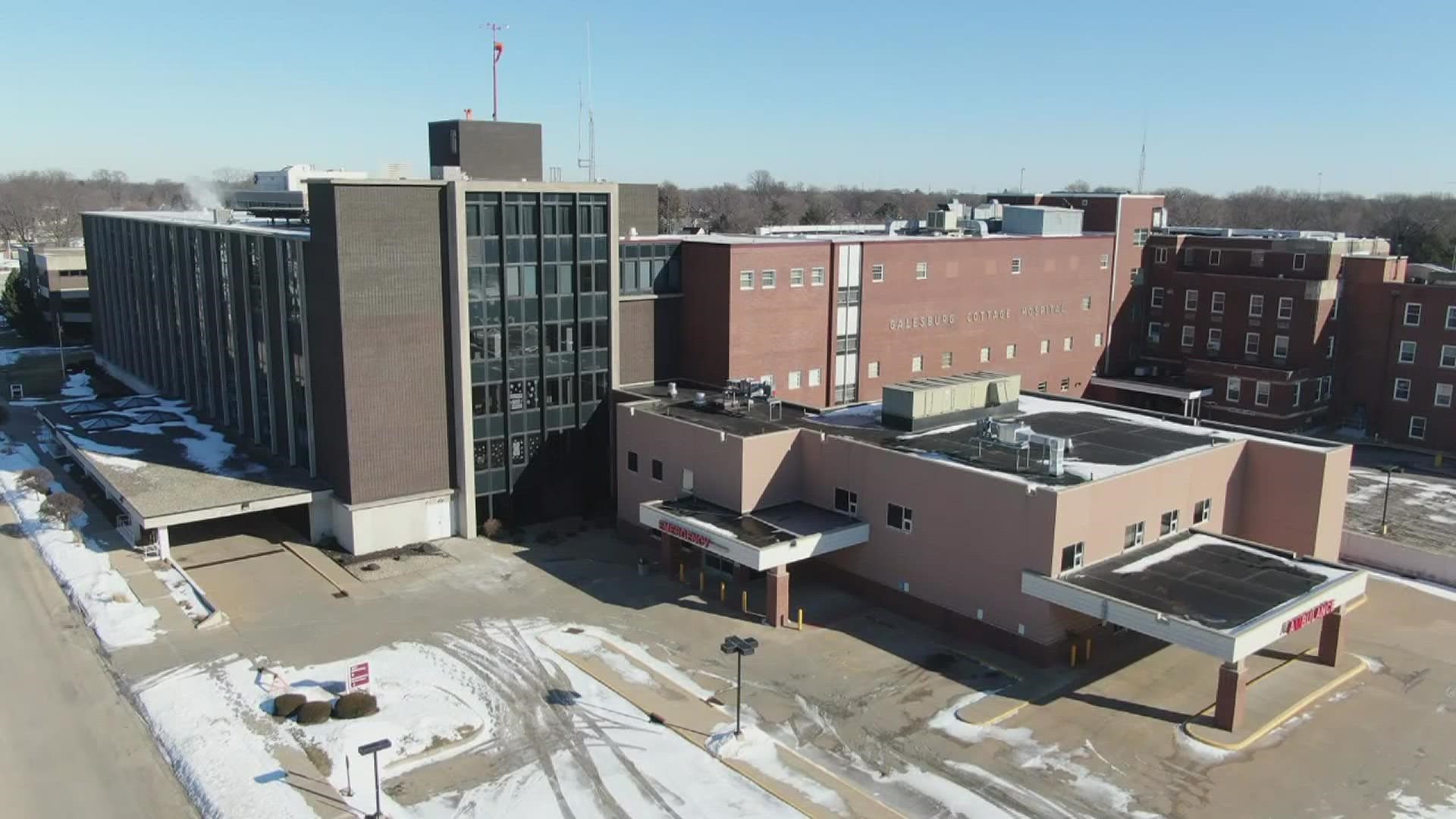GALESBURG, Ill. — New reports from the Centers for Medicare & Medicaid Services shed more light on the situation inside Galesburg Cottage Hospital in the months leading up to the facility's abrupt closure on Jan. 8.
CMS investigators made four in-person visits to the hospital, from Nov. 19 through Dec. 23. According to the subsequently-compiled reports, the investigators had walk-through tours, examined documents and personnel files and conducted interviews.
We previously reported on the first half of those findings here.
Now, CMS has released the second part of that report, which says the hospital failed to keep the building up to code, the staff certified and the patients safe.
On Dec. 7, investigators discovered expired medicine within the pharmacy. A bottle of Lidocaine (an anesthetic) that had expired on Oct. 22 as well as nine vials of Definity (a medicine used during echocardiograms) that had expired on Dec. 1 could be seen by CMS representatives, according to the report. During the discovery, Cottage's director of pharmacy verbally agreed the medications were expired and should not have still been in stock, ready for use.
That same day, investigators found two half-full oxygen cylinders standing, unsecured, in the Older Adult Behavioral Health Unit. Those same items should have been securely placed in a stand or chained to the wall in a secure area, so as to avoid injury, property damage or a fire, said the report.
Later, on Dec. 8, the investigators wrote, "In the medical gas manifold room it was observed that multiple nitrous oxide tanks were unrestrained or otherwise protected from tipping or falling." Failing to secure compressed gas cylinders could affect employees during maintenance routines, CMS documented.
And over in the Nuclear Medication Department, a CrossTrans 206 Dielectric Oil was found sitting under a counter cabinet. That item, according to the report, is an inhalation hazard and should have been placed in a properly-marked hazardous materials location. Cottage's manager of radiology later agreed with the investigators that such a supply should not have been stored in an unapproved area.
Additionally, CMS was unable to review months of missing documents related to mandatory fire drills and required weekly testing of the hospital's backup power generator.
At the same time as the investigations were being conducted, new and remaining nurses were being pulled out of trainings and orientations to help out with staffing shortages. From March 1 to Nov. 17, Cottage laid off 128 employees.
Managers were being forced to work the floor, caring for patients, while also directing other nurses.
"The hospital failed to ensure an adequate number of qualified staff were available to provide safe patient care," the report stated.
One nurse in the behavioral health unit, who was required to have crisis prevention intervention training (CPI), did not have documentation of such. Instead, this employee told investigators, "Didn't have any preceptor, just observed myself... all myself by watching others."
Another employee, who was documented administering packs of blood to a patient in CMS's findings, lacked the documentation needed to be oriented to the medical/surgical unit and/or carry out the blood administration.
On Dec. 10, a review of the pharmacy personnel files uncovered a pharmacist and a pharmacy technician that did not have documentation of required competency testing. Later on, the hospital's human resources department admitted to knowing about these issues, while still letting the employees in question perform their jobs.
Plus, there were major red flags surrounding patient rights and safety.
Certain psychiatric patients are required to have checkups every 15 minutes. But according to the CMS report, several days went by without many of those visits.
On Nov. 30, a patient diagnosed with dementia and behavioral disturbance missed the checkup at 6 a.m., 6 p.m., 6:15 p.m., 6:30 p.m. and 6:45 p.m. Another patient with borderline personality disorder was not checked up on several times throughout several days, from Nov. 6 all the way through Dec. 5.
Additionally, restraints can be used if the patient is presenting a danger to themselves or others, and as long as the nurses are properly trained with restraints as well as conduct a face-to-face evaluation of the patient within one hour of the restrains being implemented.
Back in early October, one patient was reportedly aggressive and restrained by the police department and EMS workers. The emergency department staff at Cottage placed the patient into 4-point leather restraints, but the clinical record failed to show documentation of the required face-to-face checkup after one hour.
In fact, CMS investigators reviewed personnel files of five employees and determined four were missing documentation of required CPI and restraint training.
Since summer 2020, Cottage Hospital has been owned by Dr. Sanjay Sharma, his wife Priyam and son Sanyam. None of the Sharmas, nor Cottage's human resources department, responded to multiple requests for comment.
Sharma has previously told media he plans on appealing CMS's findings and the government's subsequent decision to pull all Medicare and Medicaid funding from the facility. It's a process that takes months and requires a probationary period.
But as of Feb. 10, CMS told News 8 no one from Cottage or the Sharma family has attempted to start that appeals process.

